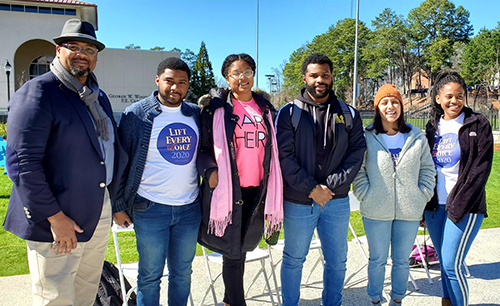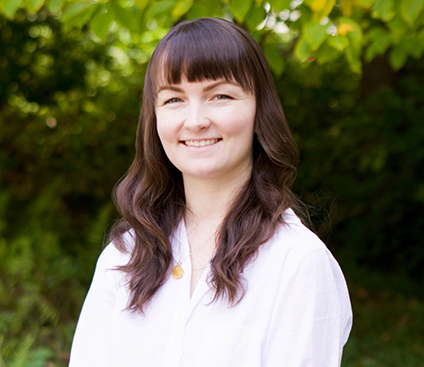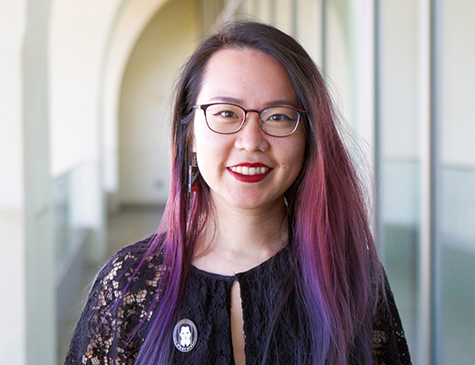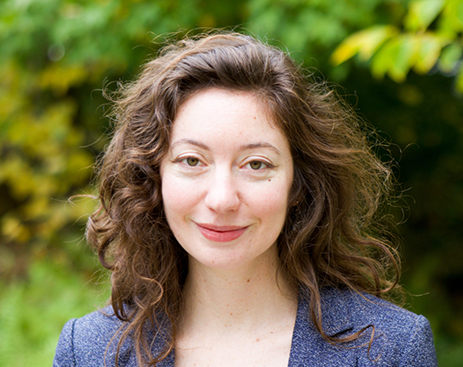Each academic year, Emory Libraries partners with the Laney Graduate School to sponsor the Woodruff Library fellowships that provide Emory graduate students with immersive and meaningful experiences. The fellows work in research and public engagement with Emory librarians; on digital projects with the Emory Center for Digital Scholarship (ECDS); on archival and engagement projects with the Stuart A. Rose Manuscript, Archives, and Rare Book Library; and on instruction and student engagement with the Emory Writing Center and librarians.
Rebecca McGlynn took on several projects as the Woodruff Library research and engagement fellow, working with the Research, Engagement, and Scholarly Communications (RESC) division. Her main project was creating a more user-friendly website for the Rose Library Artists’ Books Showcase, with help from the Emory Center for Digital Scholarship (ECDS). McGlynn migrated content to the new website, added background on the artists and the collection, and expanded the suggested-reading section.
McGlynn also conducted a collections assessment with an Ireland-based book supplier (she recently completed her PhD in English literature focusing on contemporary working-class Irish literature); created new content for graduate and undergraduate LibGuides; and worked with Sarah Morris, head of instruction and engagement for the Emory Libraries, to co-teach library instruction sessions that help undergraduates with their research projects.
“My favorite aspect of the fellowship was probably working in a research environment where I got to collaborate with people every day on different projects,” McGlynn said. “The work of a graduate student can be very isolating; we’re in the archives or in the book stacks by ourselves. Having a desk in the RESC department and seeing other people each day, updating them on my current projects, was something that I hadn’t had before in a professional setting. It was so wonderful to be able to have that kind of accountability to keep me on track.”
“I was thrilled to have the opportunity to work with Rebecca over the past year,” Morris said. “She juggled an incredibly wide range of projects, and she also consistently took the initiative to share new ideas and tackle new projects. The entire team will miss her energy, ideas, and dedication to her work.”
Jennifer E. Morgan, the Mellon Interventions Public Scholar for the Rose Library, worked on the Lift Every Voice 2020 project. She began in the fall with the project team and her fellowship sponsor, Rose’s curator of African American collections Pellom McDaniels III, who passed away unexpectedly in April. Morgan continued her work with the Rose Library project team, which consists of digital archivist Elizabeth Russey Roke (now serving as sponsor), community outreach archivist Lolita Rowe, visiting archivist Jina DuVernay, and Woodruff Library U.S. history librarian Erica Bruchko.

From left, Pellom McDaniels III and Emory’s Douglass Day student readers Timothy Richmond, Zariah Embry, Deen Whitaker, Kassie Sarkar, and Jordan Bates.
The Lift Every Voice 2020 project focuses on the Reconstruction Era, citizenship, and what it means to be a citizen. Morgan’s work has centered on creating a database of materials from Rose Library’s collections that relate to African American life during Reconstruction for use in projects designed to generate public interest in the legacies of Reconstruction. The initiatives include content for a project website and social media, educational resources, a series of recorded interviews with scholars and activists on Reconstruction-related Rose Library materials, and a public reading by Emory students from a Frederick Douglass speech held on Feb. 14.
“The project has been invaluable for me in several ways,” Morgan said. “It has cultivated my understanding of the archival collection itself as a historical artifact and it has educated me in how to build public-facing history projects.”
“As a historian of the 18th century, I hope that projects like this one will potentially reshape how we understand Reconstruction by allowing the public to envision it in a broad context,” Morgan added. “Being a part of this project has been amazing and I believe that this project can and will continue to be impactful for the Rose Library, for Emory, and for the broader community.”
“Jennifer has been invaluable to the Lift Every Voice initiative,” Russey said. “Her dogged pursuit of materials related to Reconstruction within the Rose Library’s collections and subsequent work to document and promote them in this project is a lasting gift to future scholars.”
Amy Li, the digital humanities fellow, worked with the Emory Center for Digital Scholarship (ECDS). One of her projects was to digitize a series of 1980s and ’90s Atlanta-based zines – handmade alternative magazines – from the Rose Library’s punk collection, which would then be used for a future online exhibit. She met with collection curator Randy Gue and head of collection processing Sarah Quigley to make the selections, then with copyright and scholarly communications librarian Melanie Kowalski to secure something the original zine creators were completely unconcerned about – copyright permissions.
“A lot of these zines were written under pseudonyms, so copyright and fair use was a distinctive problem,” said Li, who recently completed her PhD in English, with a focus on representations of embodiment and monsters in science fiction literature and media. “I ended up going down a lot of rabbit holes Googling people’s pseudonyms, searching through Facebook friends lists. It was a very interesting experience and quite fun actually.”
Li also redesigned ECDS’s blog site, wrote many of the blogs and helped others draft their entries, and added photos to older posts; continued in her previous role as social media coordinator, worked as an editorial assistant for Atlanta Studies Journal, and posted content to the Atlanta Studies Network webpage in support of ongoing grant applications.
“I have been consistently impressed with Amy’s organization, diligence, and creativity in her work as the ECDS digital humanities fellow,” said Jesse Karlsberg, ECDS senior digital scholarship strategist and Li’s fellowship sponsor. “She reinvigorated the blog and its social media presence, increasing our activity and engagement rates. And she showed patience and persistence during the multi-step zine project, navigating complex ethical issues around rights and controversial content.”
As the instruction and engagement/Writing Center fellow, one of the projects Jordan Daniels focused on was developing productive and supportive writing communities at dissertation boot camps for doctoral students. Boot camp students met in person for a daylong session once a month for five months, with blocks of writing interspersed with periods of sharing problems and tips, which builds a network of support.
Daniels also tutored undergraduate and graduate students at the Writing Center and mentored other tutors that worked for the center. Tutors strive to help students find their own writing process that works best for them, rather than trying to enforce an established method, she said.
“I learned so much about writing, such as how to guide students in individual writing projects as well as how to organize a space and a community for writers,” Daniels said.
When Emory University moved to online classes in response to COVID-19 stay-at-home orders in mid-March, Daniels successfully transitioned the boot camps and the writing communities to a virtual format; her goal was to keep those communities intact. Instead of monthly eight-hour sessions, she changed them to weekly four-hour meetings, with more breaks for the students to talk about daily writing goals and roadblocks.
“The in-person boot camps that Jordan hosted were very popular – almost all of them had full attendance,” said outreach and education librarian Erin Mooney, who supervised Daniels’ fellowship. “When the Library closed due to the quarantine, she transitioned to weekly sessions on Zoom. She was so successful in keeping those communities intact that some participants continued to have two-hour boot camps for five more weeks after the program concluded.”
For more information on the Emory Libraries/Laney Graduate School fellowships, please visit the Libraries fellowships employment webpage.
by Maureen McGavin, Emory Libraries writer
Related links:
Read the introductory blogs on each of the Woodruff Library fellows (November 2019)



